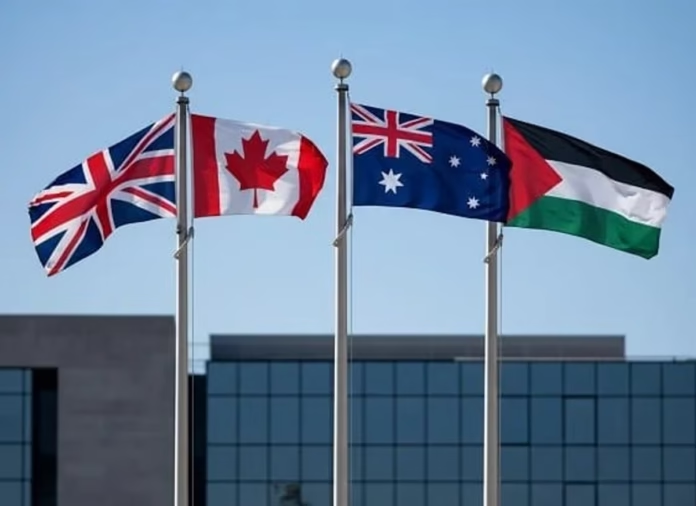The war in Gaza remains a top concern at the United Nations General Assembly, where world leaders are pushing hard for an independent Palestinian state as part of a two-state solution. This call for Palestinian statehood has gained fresh urgency, especially as more Western countries step up. The UK, Canada, Australia, and Portugal recently joined Spain, Ireland, and Norway in formally recognizing Palestine. France’s President Macron is set to follow suit soon, tying his decision to a 42-point “day after” plan crafted with Saudi Arabia. Known as the New York Declaration, this roadmap outlines clear, time-bound steps toward the two-state solution—and 142 countries backed it at the UN this month.
These moves signal growing frustration worldwide with Israel’s military actions in Gaza. They aim to isolate Israel on the global stage and boost support for Palestinian rights. But experts warn that recognition alone is mostly symbolic. Real progress on Palestinian statehood demands action from everyone involved to tackle key roadblocks.
First, Israel has actively blocked statehood efforts, especially with backing from the Trump administration. Second, the Palestinian Authority (PA) struggles to build a strong, accountable government despite recognition from 146 countries. Third, Arab states offer some financial help and public support, but they’ve fallen short on unified pushes for results. Fourth, countries that recognize Palestine haven’t followed through with the tough steps needed to make it real.
European nations play a crucial role in advancing Palestinian independence. They can’t stop at words— they need to dive into practical support. This includes direct economic aid for Palestinian institutions and infrastructure, with strict accountability. Countries should set up trade deals with Palestinians that bypass Israel to grow their economy. Boost Palestine’s status in global organizations, offer legal help for international recognition, and upgrade Palestinian offices in European capitals to full diplomatic missions. Fund public campaigns to build grassroots support for Palestinian statehood at home. Finally, provide training for Palestinian security forces, in coordination with Israel where possible, to keep stability.
The European Union could also pressure Israel by hitting its economy. As Israel’s top trading partner—handling 32% of its goods trade in 2024—the EU has leverage. Options include raising tariffs on Israeli products, kicking Israel out of the Horizon Europe research program, ending billions in trade perks (which needs a strong majority vote, not full agreement), and banning arms sales to Israel. Spain’s Prime Minister Pedro Sánchez just pledged that last one. At its core, this tests whether the West will stand by international law and help end the Israeli-Palestinian conflict.
The Palestinian Authority can’t just wait for outside help. To turn Palestinian statehood from a dream into reality, the PA must act decisively. Start by reaffirming recognition of Israel and jumping into unconditional peace talks—this puts pressure on Israel to prove it’s serious about peace, not just security fears. Ramp up public diplomacy through media and outreach to win global hearts and minds. Show real commitment to democracy and human rights to keep Western backers on board.
Develop clear economic plans to attract aid from supportive nations. Stick to nonviolent strategies to claim the moral high ground. Clean up the education system by removing hate speech and incitement, addressing a major Israeli worry. And hold fresh elections open to all factions that renounce violence and embrace peace—violent resistance has only strengthened Israel’s hand over the years.
Arab states must step up too, especially since their ties with Israel depend on resolving the Palestinian issue. Led by Saudi Arabia, they should unite and make normalization with Israel conditional on a clear path to Palestinian statehood. Threaten to cut diplomatic ties if Israel keeps violating Palestinian rights, particularly for Abraham Accords signatories. Pump targeted funds into Palestinian governance and projects for long-term growth, and use their economic clout to rally more international support.
Upgrade or open Palestinian embassies in Arab capitals, back Palestine in global courts for rights and recognition, and amplify the Palestinian story in media. Align policies to ease tensions between Israelis and Palestinians, avoiding escalations. And draw a firm red line: Any West Bank annexation by Israel will poison current and future relations.
Of course, no plan is foolproof. Israel, under Prime Minister Netanyahu and with Trump support, controls the West Bank and Gaza and will fight any statehood push. But consistent efforts from all sides—Europe, the PA, Arab states, and beyond—can shift the momentum toward a two-state solution.
After 80 years of conflict, it’s clear: Palestinian resistance through violence, like Hamas’s attack and Israel’s response in Gaza, hasn’t led to peace. The Netanyahu era and Trump’s influence will pass, but the Palestinian struggle won’t. Europe’s recognitions of Palestinian statehood could be a turning point—if they lead to bold, ongoing actions no matter what comes next.
Stay informed on all the latest news, real-time breaking news updates, and follow all the important headlines in world News on Latest NewsX. Follow us on social media Facebook, Twitter(X), Gettr and subscribe our Youtube Channel.



